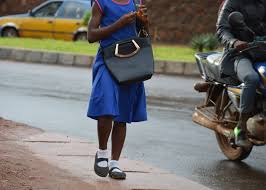… As Ekiti takes the lead in Nigeria
The Community Court of Justice, ECOWAS, has upheld the right of pregnant adolescent girls to education and to attend main stream schools.
The court in a landmark judgment held that the government policy which barred pregnant adolescent girls from mainstream/regular schools was as discriminatory as the establishment of irregular schools for them.
ECOWAS court insists the establishment of separate schools for pregnant teenage girls with a three day a week attendance and four taught subjects is discriminatory and impacts on the right to education.
Meanwhile, Ekiti State in southwest Nigeria has in November adopted a policy to ban the expulsion of girls from schools during and after pregnancy.
Although Nigeria’s Child Rights Act protects the rights of girls to education during and after pregnancy, many continue to face expulsion because there is a lack of awareness and no policies in place to ensure their continuation in school.
Ordering that the prohibitive policy in the Republic of Sierra Leone be immediately revoked, the court also directed the abolishment of separate schools established for the pregnant girls.
Likewise, it instructed that the said girls be absorbed in the main stream schools.
The three member panel of the Court had held that the Respondent (Sierra Leone ) is in breach of Articles 2, 3, 17(1), 18(3) & 25 of the Charter; Articles 28(1) of the Convention on the Rights of the Child; Articles 1 & 3 of the Convention against Discrimination in Education and ordered the country as follows:
- To immediately revoke the prohibitive policy
- To abolish the separate school established for the pregnant girls and absorb the said girls in the main stream schools
- To develop strategies, programmes and nation-wide campaigns that will remove the negative societal attitudes that support the discrimination and bias against pregnant girls attending schools.
- To integrate sexual and reproductive health education into school curricula to minimise the high rates of teenage pregnancy.
Women Against Violence & Exploitation (WAVES), a Non-Governmental Organization (NGO) registered under the laws of Sierra Leone (the Respondent State) with focus on women and girls’ rights brought an action before the ECOWAS Court against the Republic of Sierra Leone on behalf of Pregnant Adolescent School Girls alleging violation of their rights right to education and non-discrimination as provided for under Articles 2, 3, 17(1), 18(3) & 25 of the African Charter; Articles 1 & 3 of the Convention against Discrimination and Articles 28(1) of the Convention on the Rights of the Child.

The Applicant alleged that the Respondent’s Minister of Education, Science & Technology via a policy statement bared all pregnant adolescent girls from attending school when their pregnancies became visible in line with the said policy.
While they were prohibited from attending the main stream schools, as an alternative the Respondent State established other schools for pregnant girls where subjects offered are limited to only four (4) and operating three (3) days a week, essentially offering limited education. Furthermore all such students are accommodated in one classroom irrespective of age and academic progress.
The Respondent State while challenging the jurisdiction of the Court to entertain the matter on the basis that the Applicant has no locus standi to institute the action on behalf of anonymous victims of the alleged violation, also submitted that the Minister’s statement released without due recourse to the cabinet, which is the final decision making body of the Respondent State should not be attributed to it. However, it did not deny that these special schools are operative in the State.
Delivering the judgement of the Court, Hon Justice Dupe ATOKI who read judgement dismissed the Respondent’s objection with regards to jurisdiction and admitted the case.
The court explicitly held in line with its jurisprudence that “the law recognises the rights of individuals and corporate bodies who are not victims to bring an action in a representative capacity under the principle of action popularis…”Thus under this principle, NGOs and public spirited individuals are allowed to institute action on behalf of class of victims based on public interest in so far as the relief sought is not to the benefit of the Applicant.
The court equally held that, contrary to the submissions of the Respondent, the Minister’s statement is attributable and imputable to the Respondent State and same amounted to a ban on pregnant adolescent girls from attending school.
It further held that the ban is discriminatory and impacts negatively on the actualisation of the right to education of the pregnant girls, similarly the establishment of separate school for the pregnant adolescent girls with four (4) taught subjects operating three (3) days a week not being at par with the main stream schools thus providing lesser quality of education is equally discriminatory and a violation of the right to education.